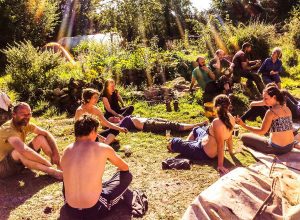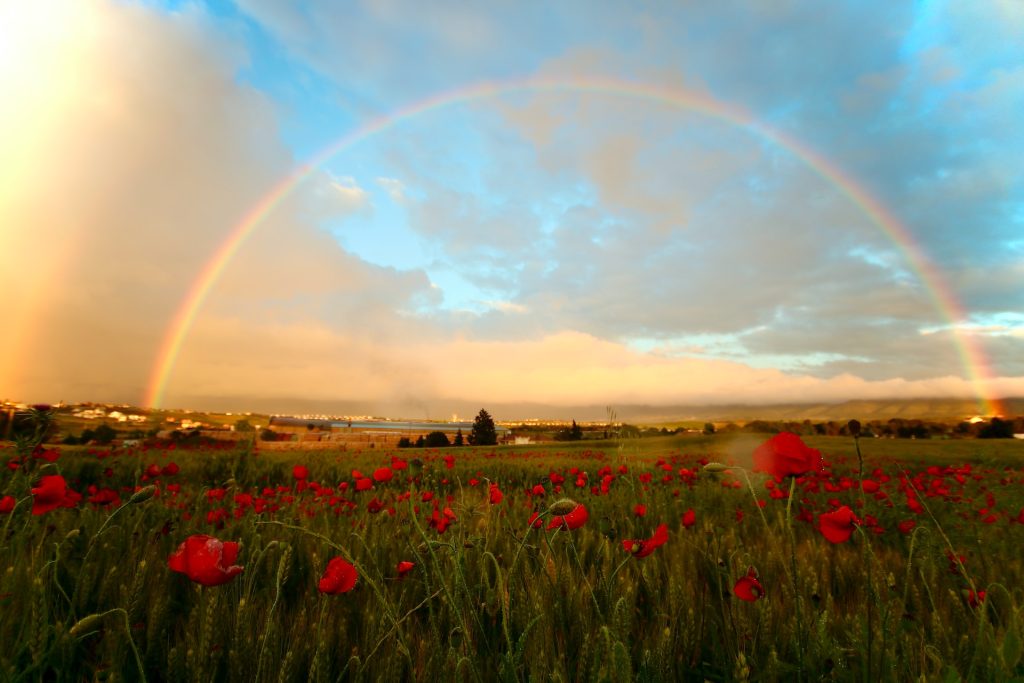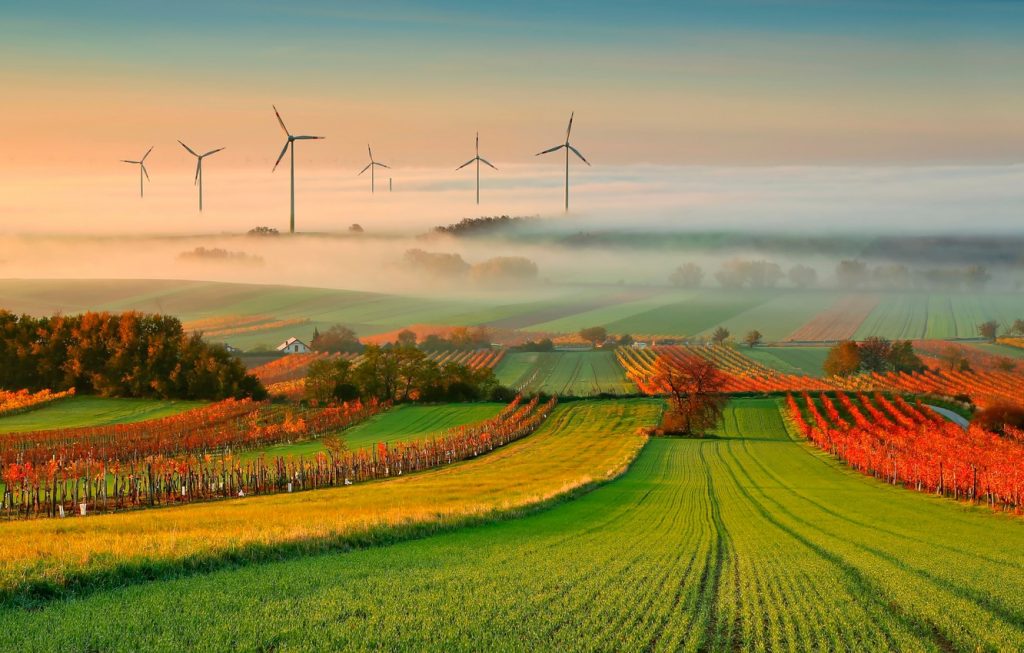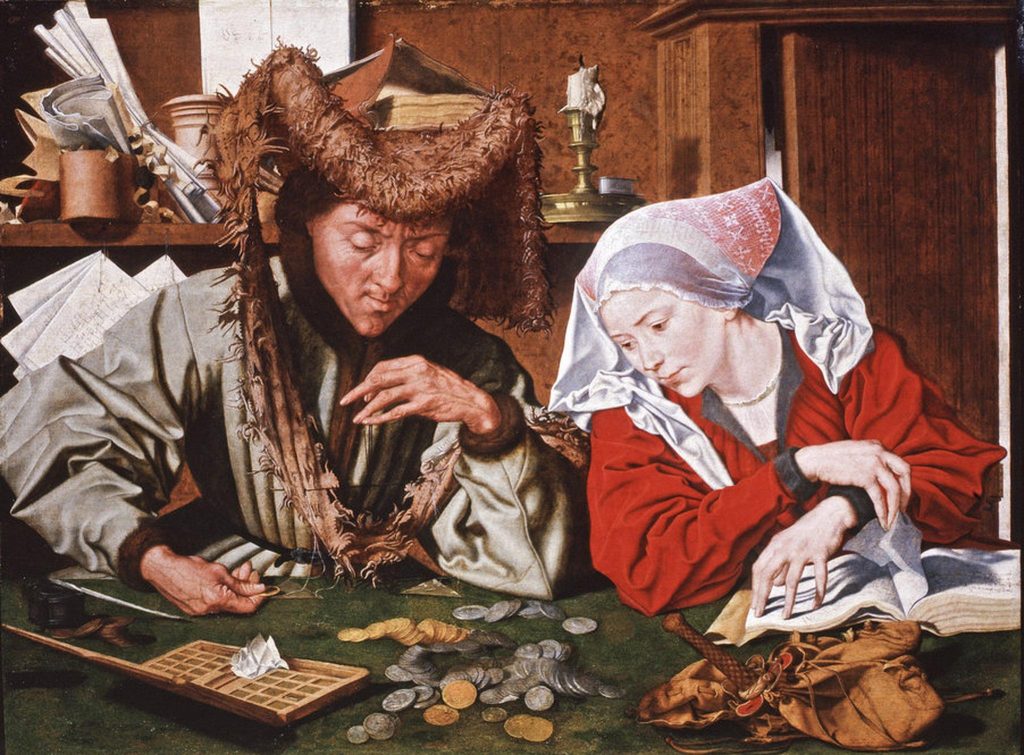The Economics of Solidarity, Spirit, and Soul
Featured image | LA Green Grounds, SQY en Transition, and Thomas Smith
Economics is a scary word. It has this way of making basic, critical questions of life – How shall we spend our time? Who gets access to which resources? – seem impenetrable, none of our business and, of all things, boring.
Most of us therefore withdraw from the conversation, and in our absence mainstream economics has crafted answers to those questions that are indeed something to fear – an economy so violently contrary to our human instincts and desires that it leaves epidemics of depression, loneliness and suicide everywhere it goes. That uses mass media and financial stress to seize control of both our days and our hearts, sparking not only economic and environmental devastation, but cultural and spiritual annihilation. That is perhaps the most effective system for sucking the life and joy from people’s souls that our Earth has ever seen. Like villagers glancing fearfully up at the castle of some dauntingly powerful vampire, we live our lives under the shadow of the economy of undeath.
Today though, cracks are appearing everywhere. The edifice is crumbling. We all know, of course, that this economy is unsustainable – devouring its very foundations as it does – but it is somehow easy to forget that this means that it will end. Easy to forget, perhaps, because for all that we resent the hollow emptiness it imparts, the prospect of its absence too is terrifying, for those of us who were only raised to secure water from a tap; food from a supermarket.
As Simon Mont has written, “Only by knowing how to stay alive without the dominant system can we actually have the courage and wisdom to abandon or dismantle it.”[i] Now is the time for us to step up with our own answers to those basic, life-defining questions. To offer some compelling responses to “Well, how would you keep the economy going?”…
***
I am writing this article from my dear compañero Mark Boyle’s small community in Ireland, An Teach Saor (The Free House). It is a home from home for me, and one of many, many places around the world where the residents are making the logic of money and the market obsolete – abandoning it, before it abandons us. For example, the ‘free pub’ and bunkhouse here – The Happy Pig – is a place where anyone can stay, free of charge, and remember what it is to not have to find money simply to have a place to exist.
You may not have heard much about such places, because that suits the corporate media just fine. But awareness of that agenda brings an emboldening thought. Doubtless, for every bastion of hope and joy you hear of or encounter, there are a hundred more that you haven’t. It is a heartening multiplication that I regularly remind myself of; a counterweight to the mainstream media’s narrow, oppressive ‘realism’.

Here at An Teach Saor a different future is being built, day by day, smile by smile. One that is grounded in relationships of love and respect, and ultimately in the only economic system that has ever truly worked – the system upon which all others have depended – Nature.
Being here is a healing, nourishing experience, surrounded by inspiring books, wild nature and wonderful, trustworthy people with hands dirty from the soil, who seek nothing more from each other than the pleasure of companionship. And once we remember the taste of freedom – of possibility – the undeath economy holds little allure.
Yet Mark’s words take me back to the wider world…
Despite knowing little or nothing of the bloody, mucky realities of land-based lives, techno-utopians will warn you to be careful not to romanticise the past. On this, I agree, and I know it first-hand.
But be even more careful of those who romanticise the future.[i]
***
Mainstream economics is walking into a deathtrap. Our globalised world finds itself caught on the horns of a seemingly impossible dilemma – either cease growing, and so collapse the economy on which we all depend, or continue to grow until we overwhelm and destroy the ecosystems on which we all depend.
The latter is the future we are headed for. All of us. It might, perhaps, be time to change direction.
But how? As my late mentor, the economist and historian David Fleming, put it,
It is certain that there are no simple answers to this—none that could be proposed without proposing at the same time a transformation in the whole of the way we think, work and order our lives.[i]
Fifty years ago he saw this central impossible dilemma of our times approaching, and devoted his life to facing the inevitable question – what might a life-sustaining, nourishing economy look like, after the impending end of economic growth?
And among the books on the shelf here at An Teach Saor rests his posthumously published book – Surviving the Future: Culture, Carnival and Capital in the Aftermath of the Market Economy.
Therein, he reminds us of just how unusual today’s ‘ordinary’ is, and how profoundly unrealistic it is to pin our hopes on market capitalism – an economic system that has existed for less than 1% of recorded history and is already not only destroying its own foundations, but those of life on Earth.
In his words,
The Great Transformation has already happened. It was the revolution in politics, economics and society that came with the market economy, and which hit its stride in Britain in the late eighteenth century.
Most of human history had been bred, fed and watered by another sort of economy, but the market has replaced, as far as possible, the social capital of reciprocal obligation, loyalties, authority structures, culture and traditions with exchange, price and the impersonal principles of economics.[ii]
This historical context is critical. What some call ‘the New Economy’ is in many ways the Old Economy. We are rediscovering the ways human beings related to each other for hundreds of thousands of years before we were ripped into isolation by the brief historical anomaly of market capitalism, into which most of us alive today happened to be born. Suddenly it makes sense that living as we do here should feel so right. After all, the Happy Pig – which sounds so radical to modern ears – is really just a rekindling of the ancient Irish tradition of hospitality. As Mont put it:
[The New Economy] is a groundswell to relying on a memory harboured in our hearts to make real a vision of humans returning to deep relationships with earth, spirit, and each other, that is constantly evolving and changing, while staying acutely cognizant of the fact that we must relearn how to keep ourselves alive without capitalism and extraction.[iii]
Fleming took that dear memory harboured in our hearts and wrote it large across the page, creating a touch-stone for reconnection. “We know what we need to do,” he writes, “We need to build the sequel, to draw on inspiration which has lain dormant, like the seed beneath the snow.”[iv]
An Teach Saor is just one among thousands of communities around the world today inspired by his sparkling, tantalising writing, which also helped inspire the birth of the now-global Transition Towns movement. Why? Because his fundamental answer to our core dilemma is so refreshing – unique, perhaps, among modern economists; that the key to a better future lies not in jobs, growth and mathematics, but in culture, community and conviviality.
To illustrate, he notes the startlingly extensive holidays of the medieval calendar (five months of each year, in some places) and ponders why the good folk of the Middle Ages were enjoying so much more leisure time than we are in our technologically-advanced society. What gives? He explains,
In a competitive market economy a large amount of roughly equally-shared leisure time – say, a three-day working week, or less – is hard to sustain, because any individuals who decide to instead work a full week can produce for a lower price (by working longer hours than the competition they can produce a greater quantity of goods and services, and thus earn the same wage by selling each one more cheaply). These more competitive people would then be fully employed, and would put the more leisurely out of business completely. This is what puts the grim into reality.[v]
So in an economy like ours, a technological advance that doubles the amount of useful work a person can do in a day becomes a problem rather than a benefit. It tends to put half the workers out of work, turning them into a potential drain on the state (or simply leaving them destiture).
Of course, in theory all the workers could just work half-time and still produce all that is needed, as is promised by today’s latest wave of automation utopians.[vi] But in practice workers are often afraid of having their pay cut, or losing their jobs to a stranger who is willing to work longer hours. In the absence of a sense of community or mutual trust, and having been taught to seek their security in a wage, people instead compete against each other for the right to perform the pointless tasks that anthropologist David Graeber memorably characterised as “bullshit jobs.”[vii]
Meanwhile, governments see that the only way to keep unemployment from rising to the point where the system breaks down is through endless economic growth, which thus becomes a non-negotiable obligation – a dogma. So we just keep growing and cross our fingers that somehow Nature will continue to bail us out forever. As Fleming put it,
Civilisations self-destruct anyway, but it is reasonable to ask whether they have done so before with such enthusiasm, in obedience to such an acutely absurd superstition, while claiming with such insistence that they were beyond being seduced by the irrational promises of religion.[viii]
Take heart though, for when the current paradigm transparently offers nothing but a literal dead end, we can be sure that we are on the cusp of a fundamental shift.
Fleming provides the radical but historically-proven alternative: focusing neither on the growth nor de-growth of the market economy, but on huge expansion of the ‘informal’ or non-monetary economy—the ‘core economy’ that keeps our society alive, even today. This is the economy of what we love: of the things we naturally do when not otherwise compelled, of music, play, family, volunteering, activism, friendship and home.
Yet over the past couple of centuries, this core economy has been much weakened, as the ever-growing stresses of precarious employment, debt and rising prices have left people with less time, energy and enthusiasm for friendships, family and fun.
As such, to sustain a post-growth economy we will need to get beyond mainstream economics’ aim of minimising spare labour. This ‘spare labour’ is what most of us might call spare time—time enjoyed outside the formal economy—a welcome part of a life well lived rather than a ‘problem of unemployment.’
Those extensive holidays of former times were far from a product of laziness. Rather they were, in an important sense, what men and women lived for. ‘Spare time’ spent in feasting, performing, collaborating and merrymaking together formed the basis of communal bonding, membership and trust.
These shared cultural ties then bind people together in cooperation, support and solidarity, the essential foundations for the communities which have thrived throughout history in the absence of economic growth (and its attendant certainty of devastating collapse) or full-time employment. As Fleming writes,
The [future] economy will depend for its existence on a deep foundation in culture. It is possible to live without it, but only for a time, like holding your breath under water.[ix]
Or as one of his readers put it – when productivity improves, “in our system you have a problem; in Fleming’s system you have a party.”
***
This is the party we are enjoying here at An Teach Saor, and in so many other communities around the world. Meanwhile, Fleming’s writing up on the shelf, with its rare combination of charm and rigour, reminds us that nurturing the core economy back to health in this way is not merely some quaint and obsolete shared longing, but an absolute practical priority – the only way our day-to-day can continue without obliterating the future.
And as we spend our days relearning how to seek our security in each other – and in Nature – rather than in money, we notice that the unfolding end of the undeath economy (no longer our undeath economy) becomes less something to fear, and more something to celebrate. We think less about what we might stand to lose and far more about the joys we had already lost and are slowly learning to regain, together. At long last we are remembering how to build a world in which, as dear David wrote, “there will be time for music.”
References
1. Mont, S. (2018). Introduction to the next economy. Tikkun, Volume 33, Number 3:16-17.
2. Boyle, M. (2019, forthcoming). The Way Home: Tales from a Life without Technology. Oneworld Publications.
3. Fleming, D. (2016). Surviving the Future: Culture, Carnival and Capital in the Aftermath of the Market Economy (p. 129). White River Junction, VT: Chelsea Green Publishing.
4. Ibid, p. 179.
5. Mont, S. (2018). Introduction to the next economy. Tikkun, Volume 33, Number 3:16-17.
6. Fleming, D. (2016). Lean Logic: A Dictionary for the Future and How to Survive It (p. xix). White River Junction, VT: Chelsea Green Publishing.
7. Fleming, D. (2016). Surviving the Future: Culture, Carnival and Capital in the Aftermath of the Market Economy (p. 75). White River Junction, VT: Chelsea Green Publishing.
8. These claims have a long history. The Democratic Review, impressed by the new technologies of the time, predicted in 1853 that by 1900, “machinery will perform all work – automata will direct them. The only task of the human race will be to make love, study and be happy”. The great economist John Maynard Keynes predicted, in 1930, that the onward march of technology in countries like the U.S. and U.K. would lead to an average 15 hour working week by the year 2000.
9. Graeber, D. (2013). On the Phenomenon of Bullshit Jobs: A Work Rant. STRIKE!, Issue 3. Available at: http://strikemag.org/bullshit-jobs
10. Fleming, D. (2016). Surviving the Future: Culture, Carnival and Capital in the Aftermath of the Market Economy (p. 180). White River Junction, VT: Chelsea Green Publishing.
11. Ibid, p. 40.






